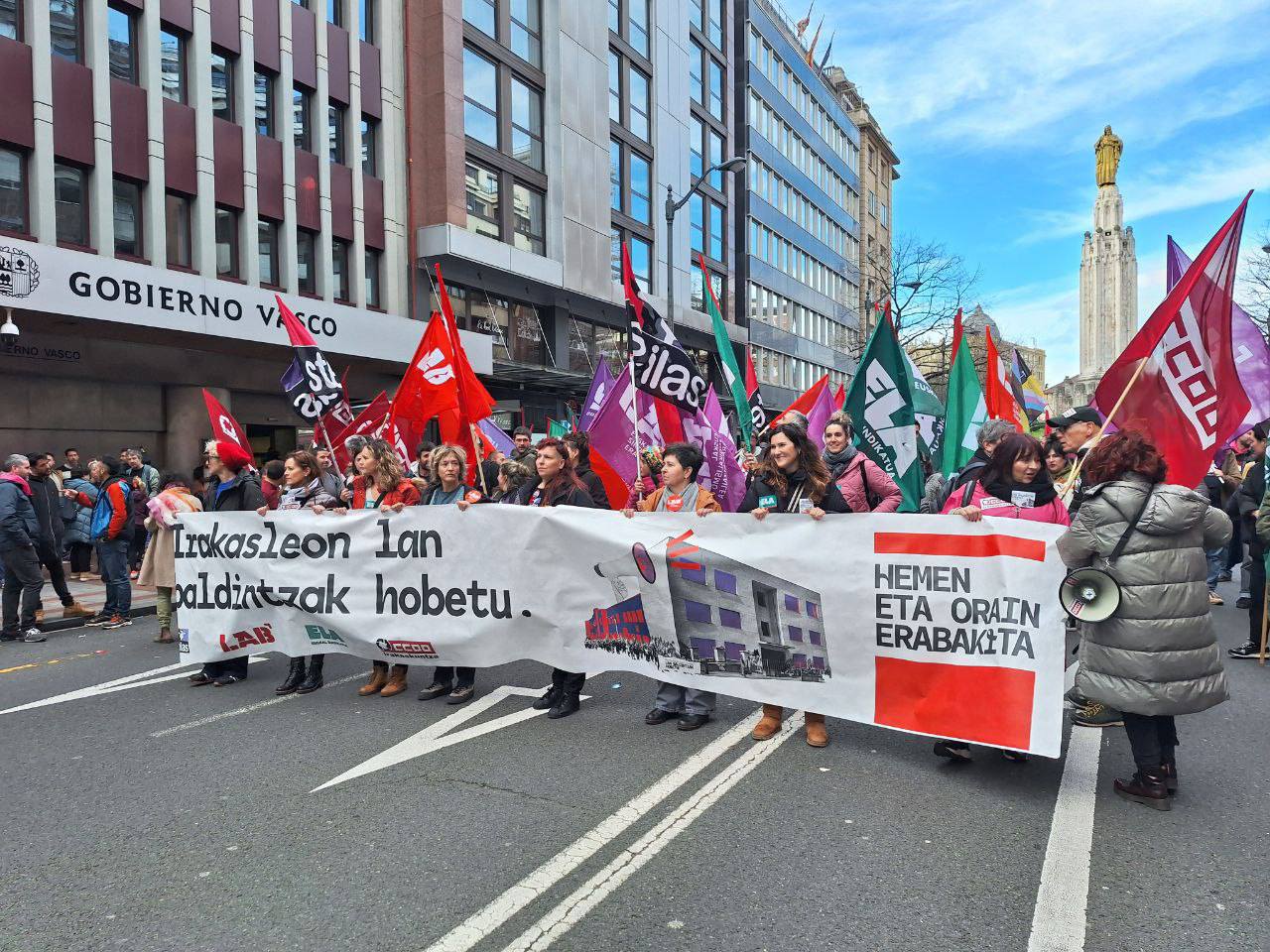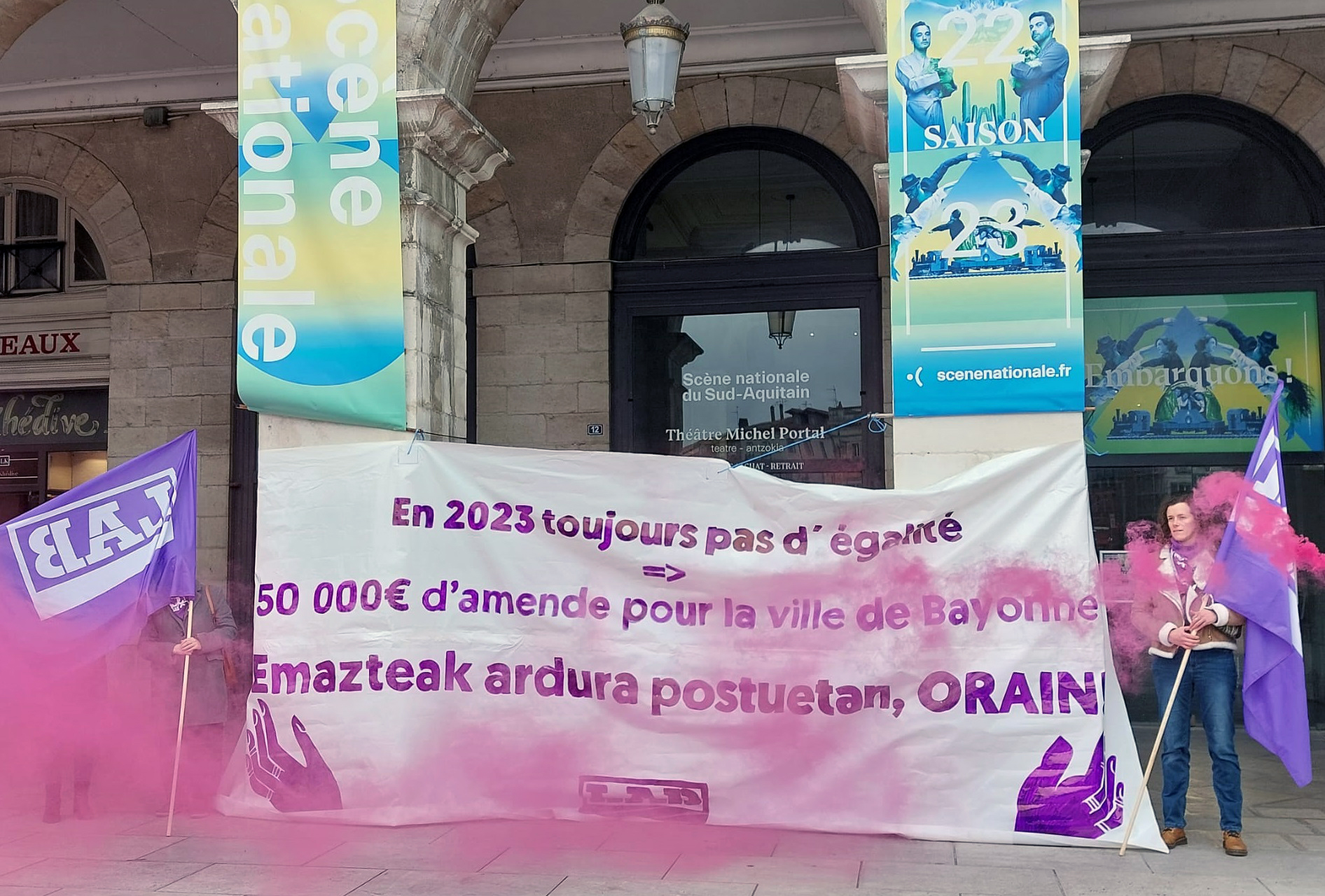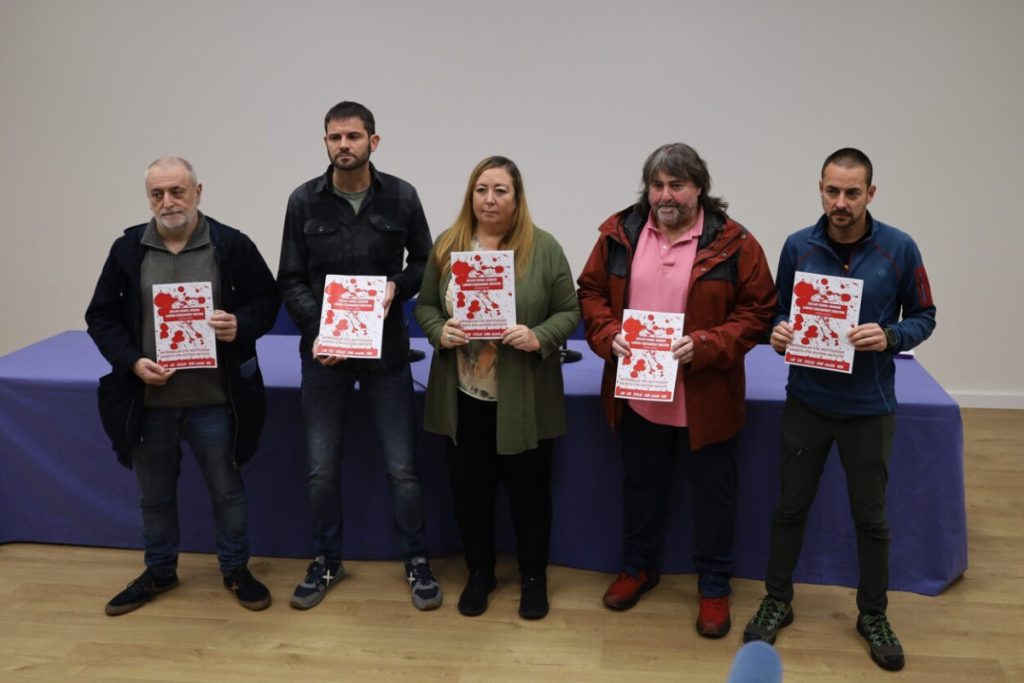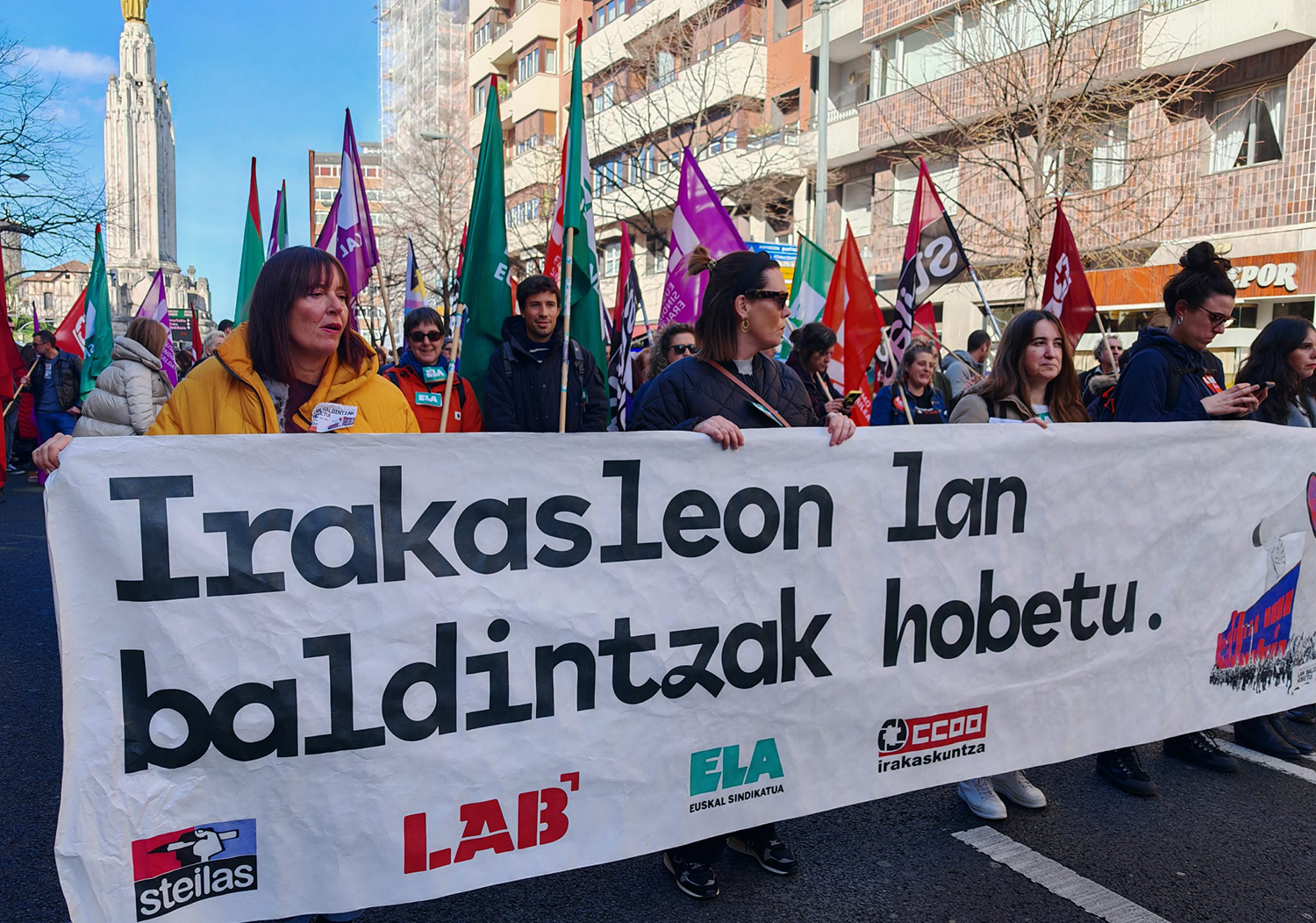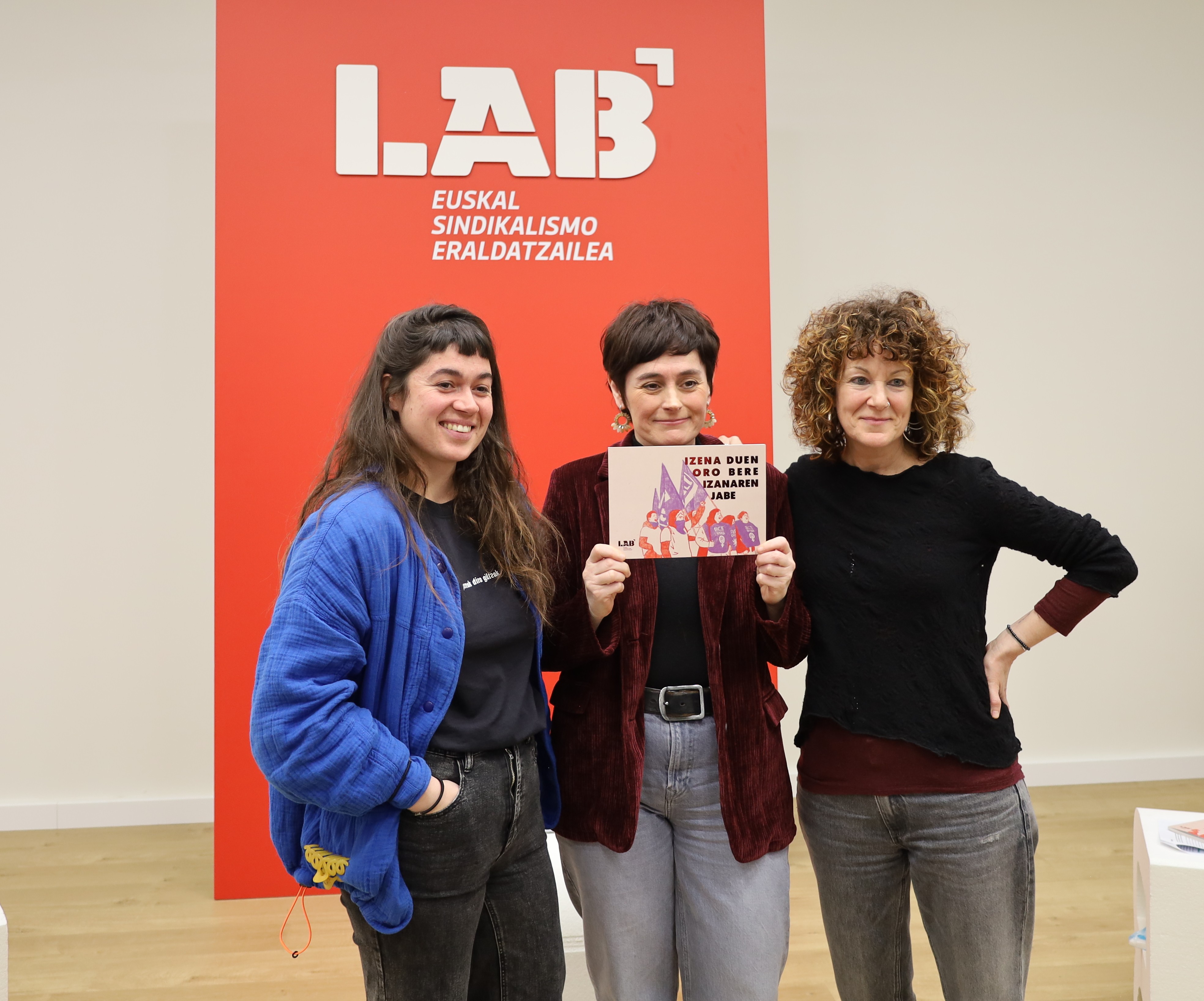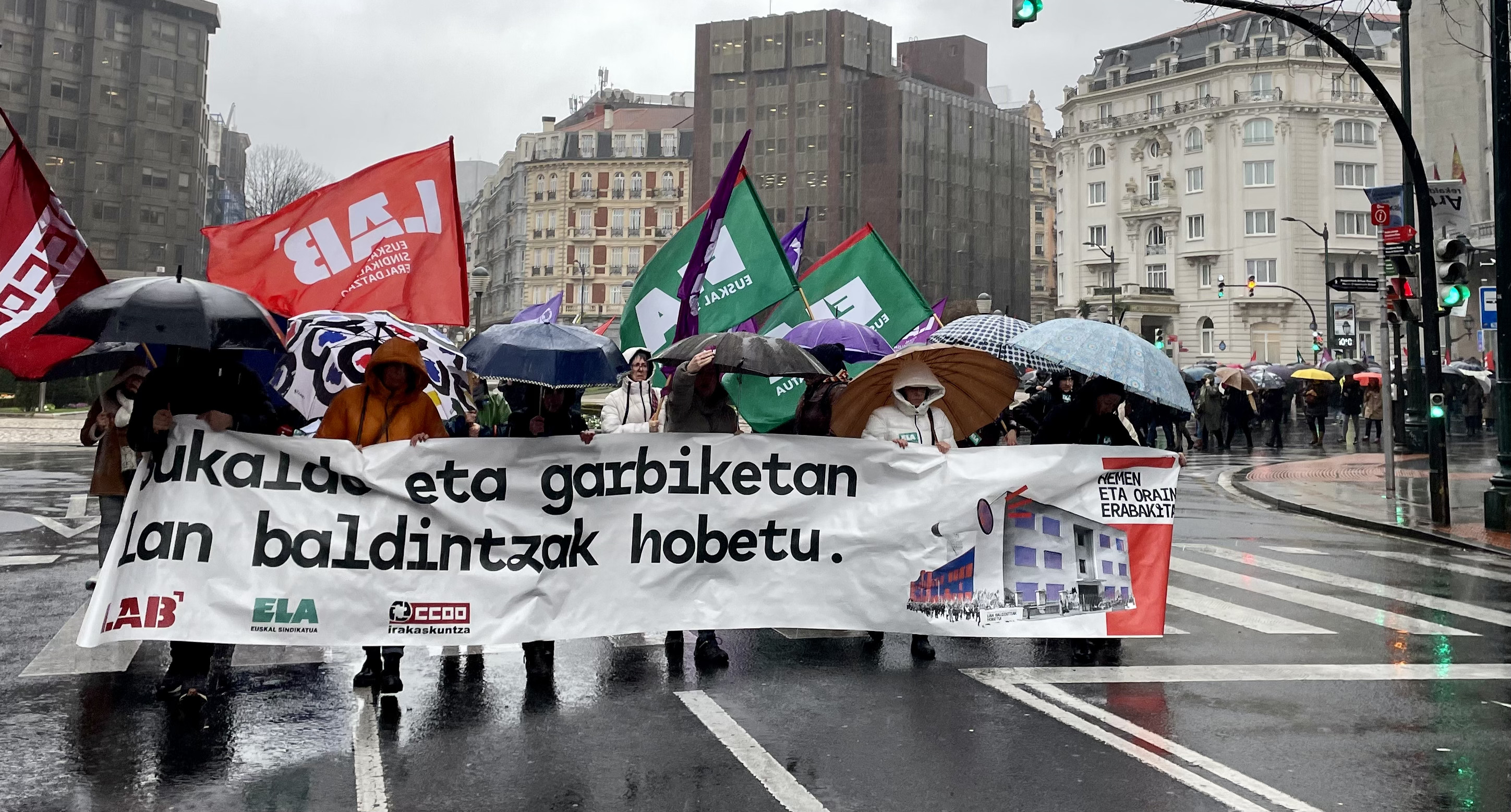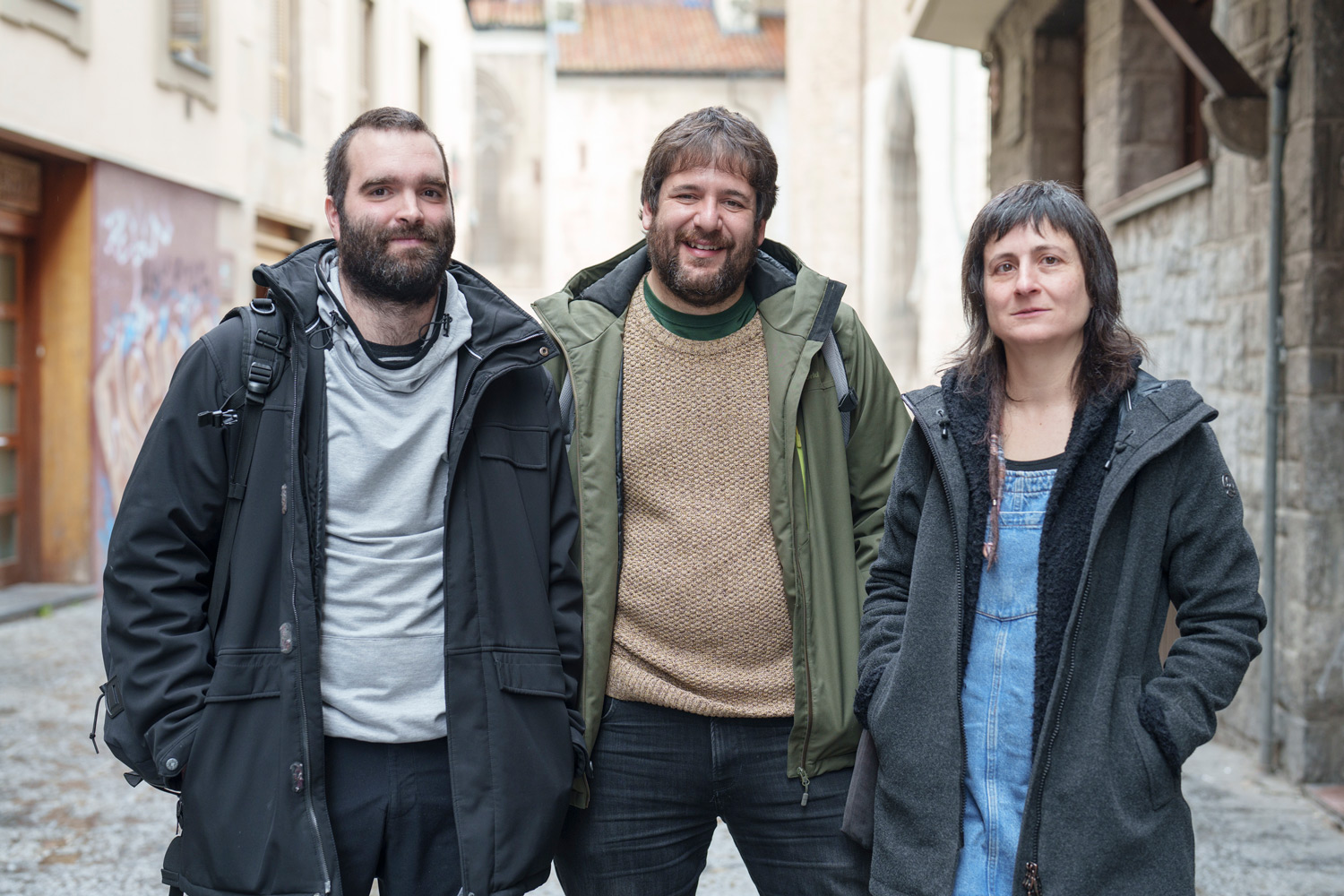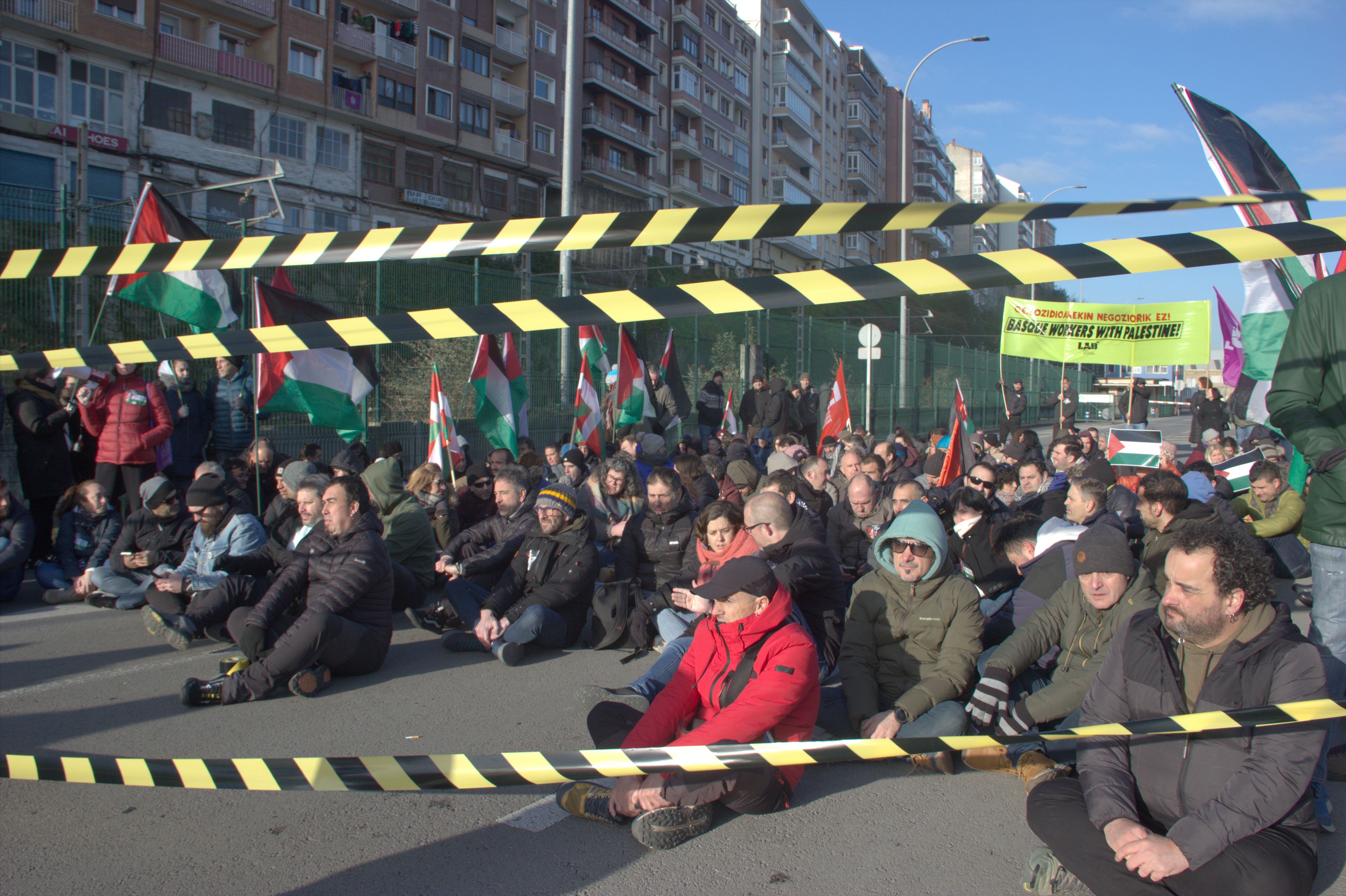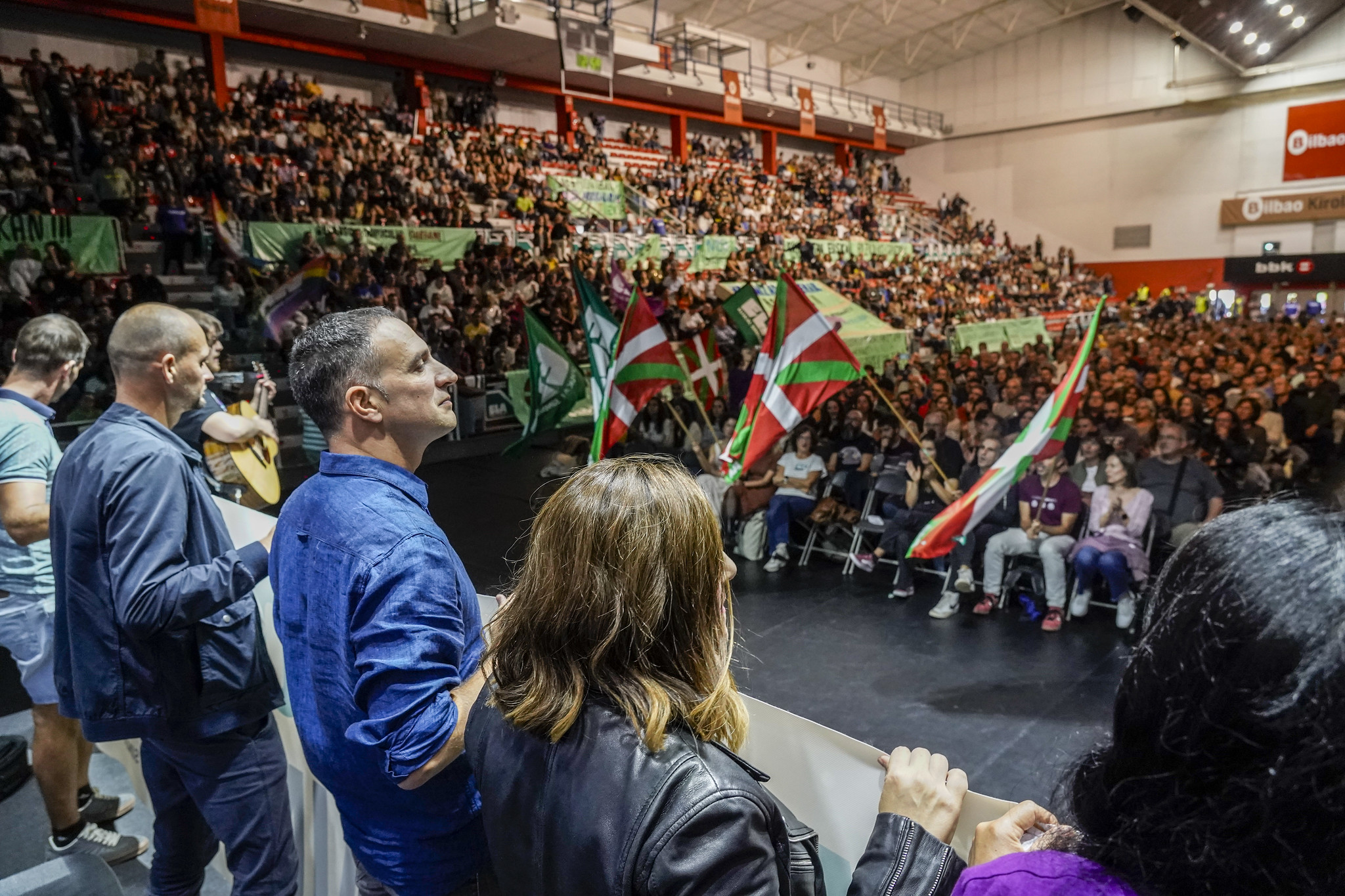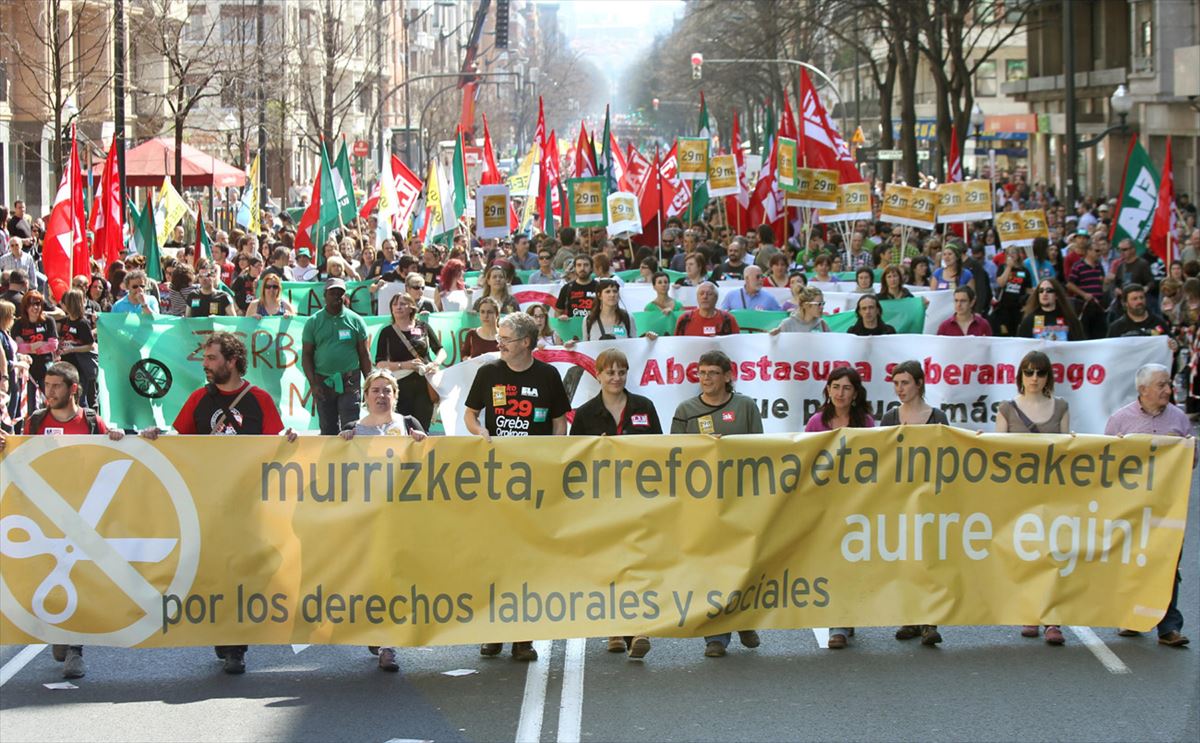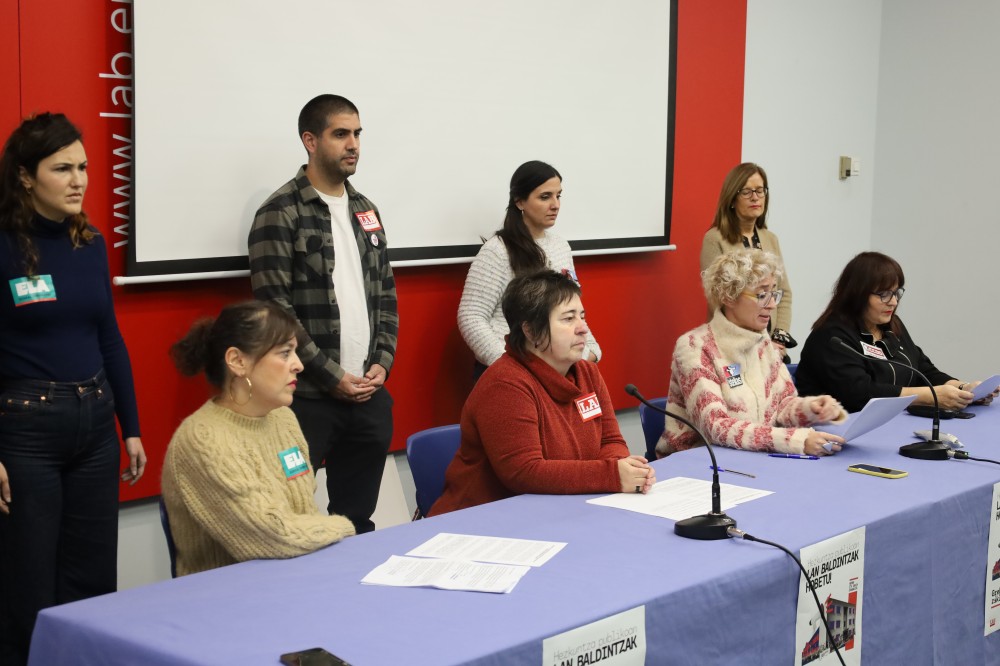"The idea that we don't work together would be a triumph for capitalism."
- Garbiñe Aranburu is the Secretary of Collective Bargaining and Union Action at LAB (born in Legorreta in 1973 and currently residing in Zaldibia). She has been on the Executive Committee of the union since 2004 and the management has now proposed to be the secretary-general, replacing Ainhoa Etxaide. The IX will be held in Vitoria-Gasteiz on 25 and 26 May. They will choose everything right in the General Assembly. “I would like to make a gesture to Rafa Díez, who will not be there,” he told us at the end of the interview.

In the words of Ainhoa Etxaide, being a secretary general "is not a gift."
I'm very conscious, it's a big responsibility. It gives a little bit of vertigo, but I'm also excited because we have a new time ahead, and that's what we've put to Congress.
Etxaide also referred to leaving a “new” union. How has LAB changed?
Labor relations have changed a lot in recent years, and since an efficiency crisis, we launched the Rethink process to put trade unionism back at the center.
What conclusions did you draw?
Trade unionism has new challenges: it is more necessary than ever, but it has fewer resources than ever. The right to collective bargaining is entirely annulled and the worker affected by it. The working class must be re-established, but to do so it is essential to renew union action, not only to take care of the employees but also of all the groups.
In addition to the Directorate's presentations, no other papers have been submitted. Is it a sign of a lack of intra-group plurality?
It is a sign that the union is well and cohesive. The two rapporteurs have had a large number of amendments, and that is where diversity is seen. It has been a very participatory process, we have created an application for it, and the truth is that it has gone better than we expected.
Here too, things have changed: the use of new technologies in the field of organization and communication.
It is clear to us that we have to adapt to the workers and affiliates to get that feedback. But it's also important to have a direct relationship with the workers, and at the factory we have a great opportunity to be face-to-face with them; we can do deeper ideological work together.
.jpg)
You mentioned the importance of union action, for this you will create a “social action structure”... what is it?
All unions have been created to respond to a reality in the male workforce. But today we recognize the work as a whole: reproductive work, other collectives, alternative models... Through federations we are structured from the management to the workplaces, but in the social field we do not have a structure that takes us to the people.
This will enable us to promote other alliances. We have, for example, the challenge of bringing the Social Charter to the people, which is often left in the abstract.
In any case, precarious workers are organizing themselves, either in the transformative economy or in movements such as Las Kellys. You have also perceived the “disaffection” with the unions, how to turn around?
We live in a process of general precariousness through labor reforms and at the same time deny us collective bargaining. Furthermore, they want to leave their responsibility behind us, questioning the role of trade unionism: if that idea prevailed that we are not effective, it would be a great victory for capitalism. Precariousness has not been created by us, but we cannot fall into conformism; that is why we see all these new realities as allies.
“If we continue to do the same, the result will be the same,” he said at a Durango event.
Collective bargaining makes it clear: negotiation has been transferred to companies and thousands of workers have been left out, because fewer and fewer people are able to negotiate in companies. Of course, we must make the most of the bargaining in companies, but we must also extend trade union action to other groups. Otherwise, the weight of inefficiency will come on our shoulders.
And how do you do that?
We have some clear demands: EUR 1,200 minimum wage, 35 hours of work, equal opportunities... We have to fight to put all this on the political agenda, to deepen the political interpellation. But in addition to the question, we also need a framework for influencing public policies, because the Labour Relations Council or the social dialogue table are tailor-made for employers, they do not serve for real dialogue.
“The Basque Government is supporting Confesbask, why? The PNV’s agreement with the PP on Spain’s budgets goes in the same direction: they have the same economic project”
Can it be one of the possible key alliances with ELA to search for alternatives?
In recent years we have been a long way away, but we give a lot of courage to that possibility. ELA is an important ally to advance our struggle with capital and the sovereign process.
So far you have had differences in collective bargaining...
We must seek consensus in the political, social and trade union fields. It is hard to imagine that we are going to push the sovereign process forward if we play each other in collective bargaining, even if we have autonomous areas.
ELA has criticized the “instrumental” character of LAB. What relationship should your union have with other political organizations on the Abertzale left?
LAB has full autonomy. Sometimes it seems that ELA puts him on the table so as not to enter into an in-depth debate. We have criticised some of the decisions taken by EH Bildu, but they cannot be equated again and again with all the political parties, and it is not the same the CAV government as the one in Navarre. The trade union cannot be limited to criticism or demand: we too have to get involved and move. To the extent that we drive social transformation, it is up to us to present proposals and promote alliances among those who share this political project.
They say that the sovereign process must be one-sided, and that a socio-economic strategy must be clear for that.
Some areas on the left tend to relativise the sovereign debate: “Why should we have a state if we live under the dictatorship of capital? Look at Greece...”. In our opinion, the state is the one that gives us the most means to build an alternative to the current neoliberal model. But as long as that is, we have to fight in the everyday; the socio-economic strategy must be the axis of the sovereign process.
But can collective bargaining be unlocked from unilateralism?
We are trying to do so, with a different kind of union action. We should attach more importance to disobedience and to democratic confrontation.
The unions reached an intersectoral agreement with Confesbask. What happens?
It served to shield the framework of its own, but the conventions have not been unlocked because, as we predicted, Confesbask is not in those keys. Meanwhile, CCOO and UGT are signing agreements in the state and here they appear as “saviors” of collective bargaining.
.jpg)
These unions, employers and the Basque Government have described the agreement to sign minority agreements as “undemocratic”.
What is happening is serious. Confesbask takes advantage of his employer’s representation, though never measured, to block collective bargaining; he called for ELA and LAB to be left out of the trade union register; and now provides coverage to the trade union minority to oppose us. Is that government supporting, why? The PNV’s agreement with the PP [on Spain’s budgets] goes the same way: Because it has the same economic project as Confesbask. CCOO and UGT are puppets of this strategy.
“We have to try to seek consensus with ELA in the political, social and trade union sphere. One cannot think that we will break the sovereign process if we stick to collective bargaining.”
LAB also sat with them in 2013 on the occasion of labor reforms in Spain.
LAB's priority struggle has been to shield the field of local negotiation, which is why we are trying to reach an interprofessional agreement. We do not rule out CCOO and UGT, because if there is a trade union majority and there are contents… In 2013 it was not possible, because Confesbask himself said no to Urkullu. But what is now has nothing to do with it, ELA and LAB wanted to take another step.
On statehood, the case of Carrefour workers in Oiartzun is to oppose negotiating the agreement in Madrid, but they say it’s like moving an ‘elephant’. How can we cope with this trend without general agreement and without bargaining power in the company?
The road taken by the workers of Carrefour in Oiartzun is very welcome. Local struggles are essential, sometimes there will be difficulties, but through them we are laying the foundations for a global agreement. In any case, I believe that in Oiartzun they will have results, the fight always gives results.
In the recent meetings of Bilgune Feminist, Saioa Iraola said that for the feminist transition we need “collective leadership”. LAB will have a joint direction, and what leadership?
We want it to be collective, less focused on the figure of the Secretary-General. We are thinking of having a double portavocía for the next course. However, it is a paritarian direction, but evidently this does not guarantee to take steps in feminist practice. It's time to go further and we're making decisions internally to make it feel across the union.
LABek, STEILASek, ELAk eta CCOOek greba egutegi bateratua aurkeztu dute Bilbon: martxoaren 25, 26 eta 27, eta apirilaren 1 eta 2. Egungo hitzarmenak aldarrikatutako edukietatik urrun kokatzen direla adierazi dute, "bai sukaldearen eta garbiketaren kolektiboan zein... [+]
Nahiz eta Nazio Batuen Erakundeak (NBE) 1977an nazioarteko egun bat bezala deklaratu zuen eta haren jatorriaren hipotesi ezberdinak diren, Martxoaren 8aren iturria berez emazte langileen mugimenduari lotua da.
2024ko laneko ezbeharren txostena aurkeztu dute LAB • ESK • STEILAS • EHNE-etxalde eta HIRU sindikatuek aurtengo otsailean. Emaitza larriak bildu dituzte: geroz eta behargin gehiago hiltzen dira haien lanpostuetan.
Grebaren bezperan Hezkuntza Sailak “edukirik gabeko” mahaia deitu zuela eta sindikatu deitzaileak “errespetatu gabe” akordioa “antzezteko” gutxiengoa duten sindikatuak “erabili” nahi izan zituela salatu ostean, beste bi greba... [+]
Lehen aldia da Hego Euskal Herriko euskal gehiengo sindikalak armagintza industriaren moldaketaz taldean eta modu publikoan hitz egiten duena. Aurreko hilabeteotan mugimendu antimilitaristak bilera bana egin du lau sindikatuokin, produkzio militarra “sozialki... [+]











